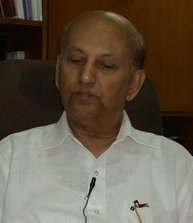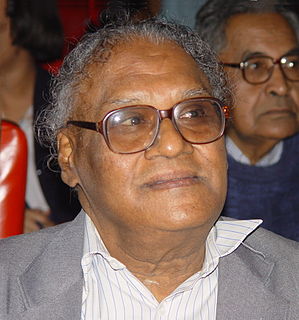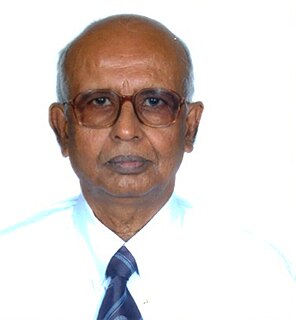Bromatometry is a titration process in which the bromination of a chemical indicator is observed. [1]
Potassium bromate alone can be used for the analysis of organoarsenicals.

Calyampudi Radhakrishna Rao, FRS known as C R Rao is an Indian-American mathematician and statistician. He is currently professor emeritus at Pennsylvania State University and Research Professor at the University at Buffalo. Rao has been honoured by numerous colloquia, honorary degrees, and festschrifts and was awarded the US National Medal of Science in 2002. The American Statistical Association has described him as "a living legend whose work has influenced not just statistics, but has had far reaching implications for fields as varied as economics, genetics, anthropology, geology, national planning, demography, biometry, and medicine." The Times of India listed Rao as one of the top 10 Indian scientists of all time. Rao is also a Senior Policy and Statistics advisor for the Indian Heart Association non-profit focused on raising South Asian cardiovascular disease awareness.

Udupi Ramachandra Rao was an Indian space scientist and chairman of the Indian Space Research Organisation. He was also the Chairman of the Governing Council of the Physical Research Laboratory at Ahmedabad and Nehru Planetarium at Bengaluru and chancellor of the Indian Institute for Space Science and Technology (IIST) at Thiruvananthapuram. He is known as "The Missile Man of India." He pioneered India's first satellite launch "Aryabhatta" in 1975.

Chintamani Nagesa Ramachandra Rao FRS, is an Indian chemist who has worked mainly in solid-state and structural chemistry. He has honorary doctorates from 83 universities from around the world, and has authored around 1,770 research publications and 53 books. He is described as a scientist who had won all possible awards in his field except the Nobel Prize.
Ayyagari Sambasiva Rao (1914–2003) was an Indian scientist and founder of Electronics Corporation of India Limited (ECIL), Hyderabad, Telangana, India.

Manchanahalli Rangaswamy Satyanarayana Rao known by the abbreviation M. R. S. Rao, is an Indian scientist, born on 21 January 1948 at Mysore, India. He has been awarded the fourth highest civilian award Padma Shri in Science and Engineering category by the Government of India. He was the President of Jawaharlal Nehru Centre for Advanced Scientific Research (JNCASR), Bangalore, India (2003-2013)

Patcha Ramachandra Rao was a metallurgist and administrator. He has the unique distinction of being the only Vice-Chancellor (2002–05) of the Banaras Hindu University (BHU) who was also a student (1963–68) and faculty (1964–92) at that institution. From 1992 to 2002, Rao was the Director of the National Metallurgical Laboratory, Jamshedpur. After his tenure as Vice-Chancellor of B.H.U., in 2005, he took the reins of the Defence Institute of Advanced Technology (DIAT) as its first Vice-Chancellor. He was to serve DIAT until his superannuation in 2007. From 2007 till the end, Rao was a Raja Ramanna Fellow at the International Advanced Research Centre for Powder Metallurgy and New Materials, in Hyderabad, Andhra Pradesh.
Palle Rama Rao FREng is an Indian scientist noted for his contribution to the field of Physical and Mechanical Metallurgy. He has collaborated and conducted research activities for over dozen universities and associations all over India and abroad. He has been honoured with the titles of Padma Vibhushan in 2011 by president of India for his contributions to scientific community. He is acting as the chairman, Governing Council, International Advanced Research Centre for Powder Metallurgy & New Materials (ARCI), Hyderabad.
Ch. Mohan Rao is an Indian molecular biologist. He holds a Ph.D. in chemistry from the University of Hyderabad. He was a visiting associate at the National Institutes of Health, US, during 1990–92. He was a visiting professor at the Tokyo Science University, Japan during 1996. Visiting Scientist, UTMB, Galveston, USA, Visiting Professor, Protein Research Institute, Osaka, Japan. Adjunct Professor, RMIT University, Melbourne, Australia. He was positioned as director for the Centre for Cellular and Molecular Biology in Hyderabad, India. He is CSIR-Distinguished Scientist and Sir JC Bose National Fellow at CCMB He was awarded in 1999 the Shanti Swarup Bhatnagar Prize for Science and Technology, the highest science award in India, in the Medical Sciences category.
Indira Nath is an Indian immunologist. Her major contribution in medical science deals with mechanisms underlying immune unresponsiveness in man, reactions and nerve damage in leprosy and a search for markers for viability of the Leprosy bacillus. Prof. Nath's fields of specialisations are Immunology, Pathology, Medical biotechnology and communicable diseases.
Valipe Ramgopal Rao is the Director of the Indian Institute of Technology, Delhi. He was a P.K.Kelkar Chair Professor in Department of Electrical Engineering, Indian Institute of Technology Bombay and is now also the Director at IIT Delhi. Ramgopal Rao has more than 475 publications in various journals, and 48 patents in the areas of Electron devices and Nanoelectronics. Ramgopal Rao was the first elected chairman for the Indian Section of the American Nano Society. He is also the recipient of multiple prizes including the Swarnajayanti Fellowship Shanti Swarup Bhatnagar Prize, Infosys Prize, Techno-Visionary award from the Indian Semiconductor Association in 2020, the IBM faculty award in 2007 and the IEEE EDS Education award in 2020 besides many others. He is a Fellow of IEEE, Fellow of the Indian National Academy of Engineering (INAE), Indian Academy of Sciences (IASc), National Academy of Sciences (NASI) and the Indian National Science Academy (INSA).
Gullapalli Nageswara Rao is an Indian ophthalmologist, the chairman of the Academia Ophthalmologica Internationalis (AOI) and the founder of the L. V. Prasad Eye Institute, Hyderabad. A former Associate Professor at the School of Medicine and Dentistry of the University of Rochester, Rao is a Fellow of the National Academy of Medical Sciences, India. He was honored by the Government of India, in 2002, with the fourth highest Indian civilian award of Padma Shri. He was elected in 2017 to the Ophthalmology Hall of Fame instituted by the American Society of Cataract and Refractive Surgery.
Paranandi Venkata Suryanarayana Rao is an Indian computer scientist, known for his researches in the fields of speech and script recognition and is credited with contributions for the development of TIFRAC, the first indigenously developed electronic computer in India. He is a recipient of awards such as IEEE Third Millenium Medal, Vikram Sarabhai Award, Om Prakash Bhasin Award and VASVIK Industrial Research Award. The Government of India awarded him the fourth highest civilian honour of Padma Shri in 1987.

Alla Venkata Rama Rao is an Indian inventor and chemist, known for his pioneering researches in the field of drug technology. He is the founder of the A. V. Rama Rao Research Foundation, a non governmental organization promoting research and doctoral studies in chemistry and Avra Laboratories, an organization dealing in intermediates and active pharmaceutical ingredients, used in therapeutics. An elected fellow of the Indian National Science Academy, Indian Academy of Sciences, National Academy of Sciences, India, and Third World Academy of Sciences (TWAS), Rama Rao is a recipient of several awards such as TWAS Technology Award, VASVIK Industrial Research Award and Om Prakash Bhasin Award. The Government of India awarded him Padma Shri in 1991 and Padma Bhushan in 2016.
Basavapatna Narayana Balakrishna Rao (1910–1995) was an Indian surgeon, medical academic, researcher, writer and the president of the Association of Surgeons of India. He was a professor and head of the department of surgery at the All India Institute of Medical Sciences, New Delhi. One of the founder fellows of the National Academy of Medical Sciences, he was also an elected fellow of the Indian Academy of Sciences. The Government of India awarded him the fourth highest civilian honour of the Padma Shri, in 1971, for his contributions to medical science.
Kanury Raoalso known as Kanury Venkata Subba Rao is an Indian immunologist. He was the head of the Drug Discovery Research Centre (DDRC) at the Translational Health Science and Technology Institute (THSTI) Faridabad..He is known for his studies in the fields of peptide synthesis and cell signaling and the design of synthetic peptide vaccines. He is an elected fellow of the Indian Academy of Sciences, National Academy of Sciences, India and the Indian National Science Academy. and a recipient of several awards including the Millennium Plaque of Honour of the Indian Science Congress and the National Bioscience Award for Career Development. The Council of Scientific and Industrial Research awarded him the Shanti Swarup Bhatnagar Prize for Science and Technology, in 1997, for his contributions to biological sciences.
Ganugapati Sree Rama Subba Rao is an Indian natural product chemist and a former chair of the department of sciences at the Indian Institute of Science (IISc). He is known for his researches on dihydroaromatics obtained through Birch reduction of aromatic compounds and is an elected fellow of the Indian National Science Academy, and the Indian Academy of Sciences. The Council of Scientific and Industrial Research, the apex agency of the Government of India for scientific research, awarded him the Shanti Swarup Bhatnagar Prize for Science and Technology, one of the highest Indian science awards, in 1982, for his contributions to chemical sciences.
Kalya Jagannath Rao, popularly known as K. J. Rao, is an Indian physical chemist and an Emeritus professor at the Indian Institute of Science. He is known for his researches on nanomaterials, amorphous Materials and ceramics and is an elected fellow of the Indian National Science Academy, National Academy of Sciences, India, International Academy of Ceramics, Asia Pacific Academy of Materials and World Innovation Foundation and the Indian Academy of Sciences. The Council of Scientific and Industrial Research, the apex agency of the Government of India for scientific research, awarded him the Shanti Swarup Bhatnagar Prize for Science and Technology, one of the highest Indian science awards, in 1984, for his contributions to chemical sciences. He is also a recipient of the Ordre des Palmes Académiques of the Government of France.
Perdur Radhakantha Adiga was an Indian endocrine biochemist, reproductive biologist, INSA Senior Scientist and an Astra chair professor of the Indian Institute of Science. He was known for his researches on vitamin-carrier proteins and Lathyrus sativus and was an elected fellow of the Indian Academy of Sciences and the Indian National Science Academy. The Council of Scientific and Industrial Research, the apex agency of the Government of India for scientific research, awarded him the Shanti Swarup Bhatnagar Prize for Science and Technology, one of the highest Indian science awards for his contributions to Medical Sciences in 1980.
Barry Ramachandra Rao was an Indian space physicist and the vice chairman of the University Grants Commission of India. Known for his pioneering research in radio physics, Rao was a Member of Parliament of the Rajya Sabha and an elected fellow of all the three major Indian science academies viz. Indian Academy of Sciences, Indian National Science Academy and National Academy of Sciences, India. The Council of Scientific and Industrial Research, the apex agency of the Government of India for scientific research, awarded him the Shanti Swarup Bhatnagar Prize for Science and Technology, one of the highest Indian science awards for his contributions to Physical Sciences in 1965.
Madan Rao is an Indian condensed matter and biological physicist and a senior professor at National Centre for Biological Sciences. Known for his research on molecular dynamics on cell surface, Rao is an elected fellow of the Indian Academy of Sciences and the Indian National Science Academy. The Council of Scientific and Industrial Research, the apex agency of the Government of India for scientific research, awarded him the Shanti Swarup Bhatnagar Prize for Science and Technology, one of the highest Indian science awards, for his contributions to physical sciences in 2004.